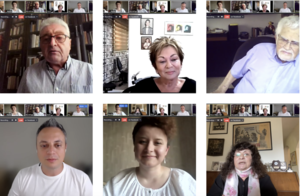JERUSALEM, ISRAEL, June 23, 2021 /24-7PressRelease/ — “Marc Chagall paints in Yiddish; if you don’t know Yiddish proverbs you cannot understand his paintings,” said Roza ben Litay in an online session arranged by Limmud FSU in cooperation with the WJC International Yiddish Center, about the place of Yiddish in contemporary Jewish and Israeli identity and culture. “Language is a state of mind, and we need to teach the Yiddish language so that people can understand the context of Yiddish literature. We cannot let the Holocaust destroy 1,000 years of Eastern European Jewish culture.”
Officially entitled “Yiddish – why do we need it,” the session featured a series of speakers between whom there was no disagreement at all. Yiddish is part of the history and culture of Eastern European Jewry; the challenge for Yiddishists today, they all agreed, is how to ensure the language – and its culture – remain alive. Or, as the session chair, Israeli-Russian comedian, Ilya Akselrod said in his opening remarks, “Yiddish cannot be a dying language; it has to be something in our future.”
Speaking to an international audience of Limmud FSU activists, which was founded in 2006 by Chaim Chesler and Sandy Cahn, and led by chairman Matthew Bronfman and president Aaron Frenkel, Litay, the daughter of the late Nechama Lifshitz, who, as a performer of Yiddish songs in the Soviet Union in the 1950s and 1960s, made a unique contribution to keeping Jewish culture and identity alive in the post-war and post-Holocaust Soviet Union, called for the reconstruction of an educational system to teach Yiddish in Israel. “Yiddish,” she said, “is part of our soul.”
Dorit Golender, Israel’s former ambassador to Moscow, and vice president for community relations at the Genesis Philanthropy Group, noted that performances in Yiddish in the Soviet Union, such as those given by Lifshitz, were a symbol. “The Zionists dreamed of coming to Israel in Hebrew, but Yiddish has a different place, a wealth of culture, a wealth of writers. Hebrew is the ancient language of Torah and Talmud; Yiddish is the language – a deeply expressive one – of the Jews of the Diaspora. We must remember and revive the language because it is our parents’ and grandparents’ history.”
Reviving it, argued Israeli specialist in Yiddish literature PhD. Mordechai Yushkovsky, academic director of the World Jewish Congress’s International Yiddish Center, “is a complex challenge. It’s a bit like the dispute of what was first chicken or the egg – do we first get the educators or the students? Today, interest in the language is part of the path to return to our Jewish identity of the previous generations, part of the search for our roots. And so we need to teach the language via the culture – literature, humor, folklore, theater, and not the other way round.”
Masha Makarova, the Head of educational projects at Russian Jewish Congress, noted that her way to Yiddish started trough immersive study of Yiddish texts by Jewish authors of prewar Poland, during her fieldtrips to currently non-existing Jewish communities. In her later research she discovered Birobidzhan, a Soviet Jewish republic, where until now Yiddish continues to be the official language in line with Russian language. Through her research she identified a unique Birobidzaner identity (whitout arguing how many Jews there are living there) through Yiddish language and specific history of the region every citizen is a bit Jewish. This created an interesting phenomenon of non-Jews learning Yiddish language and activists working with Yiddish culture.
The best example of such whould be Elena Sarashevskaya, the chief editor of the Yiddish newspaper “Birobidzhaner Shtern”, that is being published in Birobidzan. Also Masha Makarova speaks about important project of Russian Jewish Congress named “Yiddishkayt”. Through this project, the RJC supports various cultural and educational initiatives related to Yiddish, both those that already exist and those that are planned for the near future. For example, an important project is the organization of an academic program to train Yiddish translators, who will be able to work with a Jewish literature and sources in this language. The RJC also prepares educational online courses in Russian on the history of Yiddish Jewish literature for a wide audience, also in a partnership with the World Jewish Congress’s International Yiddish Center.
“In Israel,” noted Shmuel Atzmon, a renowned Israeli actor and founder of the country’s Yiddish Theater, “people identify being Israelis as being part of the country, while they connect Yiddish with being Jewish. For religious Jews, if you don’t observe the mitzvot [the commandments that regulate religious practice and behavior] you are not Jewish, but you are equally not a Jew without Yiddish. Yiddish is a civilization, which is much more than a culture. For the Yiddish writer and Nobel laureate, Isaac Bashevis Singer, the language expressed everything a people experienced over hundreds of years.” It is, Atzmon concluded, “our responsibility to ensure that there are opportunities for the younger generation in Israel to learn the language – alongside learning Ladino [the language of the Jews who moved from Spain to the Balkans and the Ottoman Empire after the expulsion in 1492] and connect to the culture. There are,” he remarked sadly, “no songs on the radio today in Yiddish. “We need to create them and then the younger generation will sing them.”
While Dorit Golender accepted that Israel is a young country and still has not had time to do everything, Atzmon urged activism to strengthen the position of the language. “People told me I was mad to set up the Yiddish-language theater; now we need to be mad again and address the teaching of the language.”
WJC International Yiddish Center in Vilnius aims to raise interest in study of Yiddish culture, and seeks to introduce and perpetuate Yiddish heritage.
The special event has been made possible with the generous support of Genesis Philanthropy Group.
—
Press release service and press release distribution provided by http://www.24-7pressrelease.com














